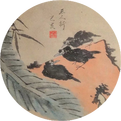The lungs are responsible for storing Qi, and all the Qi of the organs and meridians is disseminated by the lungs. The characteristic of Qi is to descend and clear; relying on the heart fire to transform and generate lung Qi. As soon as the lung Qi is formed, it already nurtures the Yin spirit, thus the nature of the lungs is to clear, consolidate, and descend. When the lung is full, Qi descends smoothly; when the lung is deficient, Qi ascends in reverse. When lung Qi descends smoothly, the breath is calm and tranquil; when lung Qi ascends in reverse, the breath is obstructed and unimpeded.The Emperor Fire (jun huo) and Minister Fire (xiang huo) root down into the Kidney Water, relying on lung Qi to consolidate them. If lung Qi ascends in reverse, the consolidating function cannot be realized, and the Emperor Fire and Minister Fire will rise and disperse, harming the Lung Metal and subsequently generating upper heat. Symptoms such as fullness, chest tightness, belching, wheezing, and coughing up blood-stained phlegm are all derived from the inability of lung Qi to descend smoothly. The reason lung Qi cannot descend smoothly lies in the stomach. When the Stomach Earth ascends in reverse, turbid Qi fills the airways, thus lung Qi has no pathway to descend.When lung Qi and stomach Qi cannot descend smoothly, the Emperor Fire and Minister Fire rise and burn, and fire cannot root in water, which will inevitably generate cold in the lower jiao. In cases of Qi stagnation, the upper jiao should be kept cool, while the lower jiao should be kept warm. When the upper jiao is cool, the Lung Metal can consolidate; when the lower jiao is warm, the Kidney Water can be stored. While it is an unchanging principle to clear lung heat while descending stomach Qi, one cannot solely use cold and cool herbs to drain the root of Yang and damage stomach Qi.The reason for the upward reversal of stomach Qi lies in the dampness of the Spleen Earth. When the Spleen Earth is damp, the central Qi cannot be properly transported, thus the Qi of the Hand Yangming Large Intestine Meridian and the Foot Yangming Stomach Meridian cannot descend. If only moistening herbs are used to nourish the dampness of the middle jiao and enhance the cold of the lower jiao, lung Qi and stomach Qi will increasingly ascend in reverse, leading to an increase in upper heat, resulting in a situation where recovery is impossible. Downward Qi Decoction (Xia Qi Tang): Licorice (Gan Cao) 6g, Pinellia (Ban Xia) 9g, Schisandra (Wu Wei Zi) 3g, Poria (Fu Ling) 9g, Apricot Kernel (Xing Ren) 9g (roasted and peeled), Fritillaria (Bei Mu) 6g (remove the heart), Peony (Shao Yao) 6g, Tangerine Peel (Chen Pi) 6g. Decoct to about half a cup and take warm. This is used to treat Qi stagnation in the right hypochondrium.
Source: “Si Sheng Xin Yuan”
Note: This article is a translation and compilation by the author based on ancient texts. The treatment methods and prescriptions mentioned are sourced from ancient texts and are for reference and study only. If needed, please consult a professional TCM practitioner for diagnosis and treatment.

